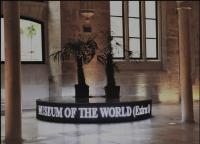 With this MEMOIRS project Newsletter, Nº 147, we conclude a journey started on May 5, 2018. To the
group of researchers of the project, to the dozens of external collaborators, to all the artists who
contributed with their images, to the producers and designers, the deep gratitude of the editors, who
are certain of two things: to have contributed to the sharing of a common good, knowledge, and to
have done so in the spirit of public service
With this MEMOIRS project Newsletter, Nº 147, we conclude a journey started on May 5, 2018. To the
group of researchers of the project, to the dozens of external collaborators, to all the artists who
contributed with their images, to the producers and designers, the deep gratitude of the editors, who
are certain of two things: to have contributed to the sharing of a common good, knowledge, and to
have done so in the spirit of public service
To read
17.01.2022 | by António Pinto Ribeiro
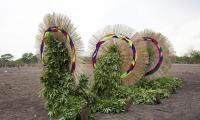 In the contemporary discussions regarding post-colonial Europe, the concepts of memory and post- memory have taken on growing importance, giving prominence to an insight with great political relevance: colonialism never ends with those who enforced or suffered it. Traces of a colonial mindset impregnate generations to come and it has been passed down through the image of the former coloniser and the former colonised. These characters restage a complex phantasmagoria closely related to the most intimate ghost of the European subconscious: its colonial ghost which manifests itself inter alia in the form of a colonial “transfer of memory” – as racism, segregation, exclusion, subalternity – or in the form of “eruptions of memory”, and thereby questions the very essence of European multicultural societies, shaped by colonial heritage and fed by waves of migration.
In the contemporary discussions regarding post-colonial Europe, the concepts of memory and post- memory have taken on growing importance, giving prominence to an insight with great political relevance: colonialism never ends with those who enforced or suffered it. Traces of a colonial mindset impregnate generations to come and it has been passed down through the image of the former coloniser and the former colonised. These characters restage a complex phantasmagoria closely related to the most intimate ghost of the European subconscious: its colonial ghost which manifests itself inter alia in the form of a colonial “transfer of memory” – as racism, segregation, exclusion, subalternity – or in the form of “eruptions of memory”, and thereby questions the very essence of European multicultural societies, shaped by colonial heritage and fed by waves of migration.
To read
31.10.2021 | by Margarida Calafate Ribeiro
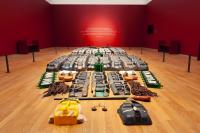 Rather than perceiving a national museum as a mere repository of cultural artefacts emblematic of either the elite’s values or its fetishization of those it excludes and rejects, the curators of Slavery have fully embraced their educational responsibility and their duty to actively contribute to cultural life in the present. All of which cannot prevent a feeling from remaining, that the fires of purgatory still rage on and much must yet be done to extinguish them.
Rather than perceiving a national museum as a mere repository of cultural artefacts emblematic of either the elite’s values or its fetishization of those it excludes and rejects, the curators of Slavery have fully embraced their educational responsibility and their duty to actively contribute to cultural life in the present. All of which cannot prevent a feeling from remaining, that the fires of purgatory still rage on and much must yet be done to extinguish them.
To read
15.08.2021 | by Paulo de Medeiros
 Hoje o Tarrafal é um museu e monumento nacional e, desde 2004, integra a lista indicativa de Património Mundial da UNESCO. Portugal, para além de ter ajudado com a criação e desenvolvimento deste museu, anunciou em 2019 que iria apoiar Cabo Verde com a sua candidatura do Tarrafal à UNESCO. Recentemente, foram levadas a cabo obras de restauro do espaço, por uma empresa portuguesa, e no próximo 5 de Julho, os governos de Cabo Verde e Portugal vão assinar um memorando de entendimento para a candidatura deste espaço à UNESCO.
Hoje o Tarrafal é um museu e monumento nacional e, desde 2004, integra a lista indicativa de Património Mundial da UNESCO. Portugal, para além de ter ajudado com a criação e desenvolvimento deste museu, anunciou em 2019 que iria apoiar Cabo Verde com a sua candidatura do Tarrafal à UNESCO. Recentemente, foram levadas a cabo obras de restauro do espaço, por uma empresa portuguesa, e no próximo 5 de Julho, os governos de Cabo Verde e Portugal vão assinar um memorando de entendimento para a candidatura deste espaço à UNESCO.
Mukanda
24.06.2021 | by Sofia Lovegrove
 The events of the past six years have sharpened Gilroy's observations. At the same time, they have made it increasingly clear that, despite the real progress achieved, attempts to maintain privileges based on structural and systemic inequality, whether in terms of class, gender or race, have become even more obstinate. Attempts that go hand in hand with the futile but devastating efforts to deny history and impose the erasure of memory.
The events of the past six years have sharpened Gilroy's observations. At the same time, they have made it increasingly clear that, despite the real progress achieved, attempts to maintain privileges based on structural and systemic inequality, whether in terms of class, gender or race, have become even more obstinate. Attempts that go hand in hand with the futile but devastating efforts to deny history and impose the erasure of memory.
To read
18.02.2021 | by Paulo de Medeiros
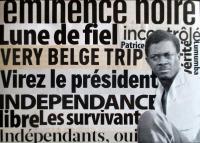 On June 30, 1960, at the ceremony for the proclamation of independence of the Congo, there were three speeches: from King Baudouin of Belgium, the former colonizing power, the President of the Congo, Joseph Kasavubu, and Patrice Lumumba, Prime Minister, the latter in an intervention not foreseen in the initial protocol. It was a short speech of about twelve minutes, written in an accessible and incisive language, performative and visual, a speech that, as the historian Jean Omasombo Tshonda defends, "founds the independent Congo". The first eight minutes are the clearest definition of what colonialism is from the point of view of a continent, a country, a community, a person.
On June 30, 1960, at the ceremony for the proclamation of independence of the Congo, there were three speeches: from King Baudouin of Belgium, the former colonizing power, the President of the Congo, Joseph Kasavubu, and Patrice Lumumba, Prime Minister, the latter in an intervention not foreseen in the initial protocol. It was a short speech of about twelve minutes, written in an accessible and incisive language, performative and visual, a speech that, as the historian Jean Omasombo Tshonda defends, "founds the independent Congo". The first eight minutes are the clearest definition of what colonialism is from the point of view of a continent, a country, a community, a person.
To read
01.02.2021 | by Margarida Calafate Ribeiro
 In the face of this new narrative that acknowledges artistic production and an appreciation of it by African communities, how do secular cultural traditions of African countries interact today with artistic training and production, in the case of Afrodescendant artists, who were born and raised in European countries? How do events in the history of Africa and Africans combine with the artistic languages of the "European schools" and, in particular, with contemporary themes?
In the face of this new narrative that acknowledges artistic production and an appreciation of it by African communities, how do secular cultural traditions of African countries interact today with artistic training and production, in the case of Afrodescendant artists, who were born and raised in European countries? How do events in the history of Africa and Africans combine with the artistic languages of the "European schools" and, in particular, with contemporary themes?
To read
28.12.2020 | by António Pinto Ribeiro
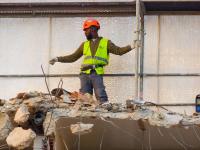 What I seek in these encounters with overseas veterans is something I am unable to translate into a simple, telegraphic formula. Among these veterans there is a very strong sense of community, an almost familiar, almost tribal communion, which at certain times seems to me incompatible with a broader sense of community. It is a communion that tends to exclude me and all those who have not shared the same experience. What I seek in these conversations are the moments, similar to epiphanies, when veterans express belonging to a larger, more comprehensive human community, necessarily organized around moral values.
What I seek in these encounters with overseas veterans is something I am unable to translate into a simple, telegraphic formula. Among these veterans there is a very strong sense of community, an almost familiar, almost tribal communion, which at certain times seems to me incompatible with a broader sense of community. It is a communion that tends to exclude me and all those who have not shared the same experience. What I seek in these conversations are the moments, similar to epiphanies, when veterans express belonging to a larger, more comprehensive human community, necessarily organized around moral values.
To read
13.12.2020 | by Paulo Faria
 German colonial experience, as is well-known, was relatively short: the defeat of the Reich in 1918 brought about its abrupt end, since the several punitive measures set up by the Treaty of Versailles included the obligation for Germany to surrender all colonial territories in its possession. This goes a long way to explain why, contrary to the Holocaust, the history of German colonialism – although it was similarly marked by forms of extreme violence, culminating in the genocide of the Herero and Nama
peoples in 1904-1906 in so-called German South-West Africa – is today largely absent from German public memory, having, concomitantly, been long subalternized by German historic research.
German colonial experience, as is well-known, was relatively short: the defeat of the Reich in 1918 brought about its abrupt end, since the several punitive measures set up by the Treaty of Versailles included the obligation for Germany to surrender all colonial territories in its possession. This goes a long way to explain why, contrary to the Holocaust, the history of German colonialism – although it was similarly marked by forms of extreme violence, culminating in the genocide of the Herero and Nama
peoples in 1904-1906 in so-called German South-West Africa – is today largely absent from German public memory, having, concomitantly, been long subalternized by German historic research.
City
13.12.2020 | by António Sousa Ribeiro
 From the point of view of an uncompromising condemnation of colonialism, the indictment of the present-day practices of the state of Israel is a logical consequence. And to condemn all forms of colonialism is not equivalent to taking on an ideological stance, it is, purely and simply, a moral imperative.
From the point of view of an uncompromising condemnation of colonialism, the indictment of the present-day practices of the state of Israel is a logical consequence. And to condemn all forms of colonialism is not equivalent to taking on an ideological stance, it is, purely and simply, a moral imperative.
To read
04.07.2020 | by António Sousa Ribeiro
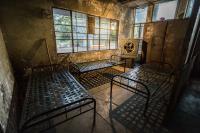 O sentimento de vulnerabilidade partilhada que hoje vivemos, enredados na crise encetada pelo coronavírus, interroga-nos, também, sobre os limites da nossa memória para democratizarmos o nosso passado, descolonizando as hierarquias raciais, coloniais e patriarcais que definem o que é alheio. Na “lembrança minha” deveria lembrar-me de inúmeras histórias de fim do mundo, histórias há muito testemunhadas por aqueles e aquelas para quem a COVID-19 é apenas mais episódio de uma continuada exposição à desigual distribuição da precariedade.
O sentimento de vulnerabilidade partilhada que hoje vivemos, enredados na crise encetada pelo coronavírus, interroga-nos, também, sobre os limites da nossa memória para democratizarmos o nosso passado, descolonizando as hierarquias raciais, coloniais e patriarcais que definem o que é alheio. Na “lembrança minha” deveria lembrar-me de inúmeras histórias de fim do mundo, histórias há muito testemunhadas por aqueles e aquelas para quem a COVID-19 é apenas mais episódio de uma continuada exposição à desigual distribuição da precariedade.
To read
30.03.2020 | by Bruno Sena Martins
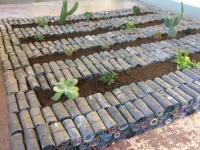 Nothing could better show that the art of memory, in the way that Boltanski thinks about it and makes it, is memory itself. It knows its workings and saves it from erasure. This is the lesson that Christian Boltanski repeats to us in all the corners of his immense oeuvre. And that, literally, makes time.
Nothing could better show that the art of memory, in the way that Boltanski thinks about it and makes it, is memory itself. It knows its workings and saves it from erasure. This is the lesson that Christian Boltanski repeats to us in all the corners of his immense oeuvre. And that, literally, makes time.
To read
07.03.2020 | by Roberto Vecchi
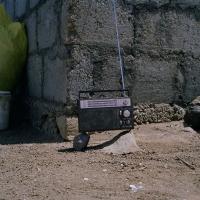 We can establish, through renewed rituals, a collective ethic of memory. This shows that the fractured past has to be used with a sense of responsibility that is public, and not private, that is of the present, and not of the past. This responsibility concerns not only Northern Ireland, but all the unheralded contexts of divided memory. Ours too.
We can establish, through renewed rituals, a collective ethic of memory. This shows that the fractured past has to be used with a sense of responsibility that is public, and not private, that is of the present, and not of the past. This responsibility concerns not only Northern Ireland, but all the unheralded contexts of divided memory. Ours too.
To read
28.01.2020 | by Roberto Vecchi
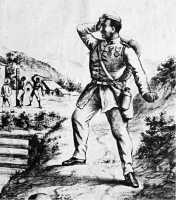 It would be a supreme fantasy to think, naively, that we can fully recognize the black blood that lies beneath the foundations of nation-empires and post-empires if we also leave in place the very stones that sustain and adorn the idea of the nation.
It would be a supreme fantasy to think, naively, that we can fully recognize the black blood that lies beneath the foundations of nation-empires and post-empires if we also leave in place the very stones that sustain and adorn the idea of the nation.
To read
28.01.2020 | by Bruno Sena Martins
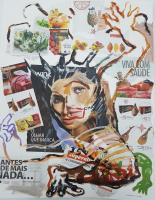 We urgently need a return to culture as the filter between individuals and the political, broadly conceived. Without this we will not escape from the current situation that, not only in Italy, finds its reflection in the protagonist of Paolo Sorrentino’s acclaimed La Grande Bellezza: the tragic, failed, mundane visage of Jep Gambardella.
We urgently need a return to culture as the filter between individuals and the political, broadly conceived. Without this we will not escape from the current situation that, not only in Italy, finds its reflection in the protagonist of Paolo Sorrentino’s acclaimed La Grande Bellezza: the tragic, failed, mundane visage of Jep Gambardella.
To read
28.01.2020 | by Lívia Apa
 In France, in spite of the economic context of the Trente Glorieuses being favourable to the absorption of labour, the socioprofessional characteristics of the French people who arrived from Algeria did not correspond to the needs of the French labour market, which required industrially qualified workers. In the Portuguese case the inverse situation pertained.
In France, in spite of the economic context of the Trente Glorieuses being favourable to the absorption of labour, the socioprofessional characteristics of the French people who arrived from Algeria did not correspond to the needs of the French labour market, which required industrially qualified workers. In the Portuguese case the inverse situation pertained.
To read
02.01.2020 | by Morgane Delaunay
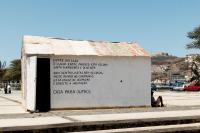 What is at stake in Djaimilia Pereira de Almeida’s book are the living, human ruins of empire. No longer based on the figure of the veteran or the returnee, but on someone from the other side of the line colonialism traced: a black man and, in this case, the complex figure that colonialism generated, the assimilated African who, here, for the first time in Portuguese literature, is at the centre of the narrative.
What is at stake in Djaimilia Pereira de Almeida’s book are the living, human ruins of empire. No longer based on the figure of the veteran or the returnee, but on someone from the other side of the line colonialism traced: a black man and, in this case, the complex figure that colonialism generated, the assimilated African who, here, for the first time in Portuguese literature, is at the centre of the narrative.
To read
26.12.2019 | by Margarida Calafate Ribeiro
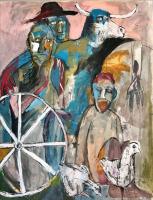 The construction of postmemory is a complex process which may take place in very different ways and, as is worth repeating, is never simply based on transmission, but, rather, implies an active positioning, a decision, on the part of members of a second generation. Such a decision is never simply played out at a strictly rational level, it inevitably presupposes a high degree of emotional involvement.
The construction of postmemory is a complex process which may take place in very different ways and, as is worth repeating, is never simply based on transmission, but, rather, implies an active positioning, a decision, on the part of members of a second generation. Such a decision is never simply played out at a strictly rational level, it inevitably presupposes a high degree of emotional involvement.
To read
30.11.2019 | by António Sousa Ribeiro
 ‘The Missing Face’ is a powerful reflection on the war, and above all on the ownership of traumatic experiences of conflict, specifically at the end of Portuguese colonialism in Africa.
‘The Missing Face’ is a powerful reflection on the war, and above all on the ownership of traumatic experiences of conflict, specifically at the end of Portuguese colonialism in Africa.
To read
12.11.2019 | by Felipe Cammaert
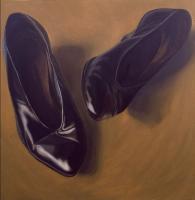 Museums are democratising, inclusive and polyphonic spaces for critical dialogue about the pasts and the futures. Acknowledging and addressing the conflicts and challenges of the present, they hold artefacts and specimens in trust for society, safeguard diverse memories for future generations and guarantee equal rights and equal access to heritage for all people.
Museums are democratising, inclusive and polyphonic spaces for critical dialogue about the pasts and the futures. Acknowledging and addressing the conflicts and challenges of the present, they hold artefacts and specimens in trust for society, safeguard diverse memories for future generations and guarantee equal rights and equal access to heritage for all people.
To read
07.11.2019 | by António Pinto Ribeiro
 With this MEMOIRS project Newsletter, Nº 147, we conclude a journey started on May 5, 2018. To the
group of researchers of the project, to the dozens of external collaborators, to all the artists who
contributed with their images, to the producers and designers, the deep gratitude of the editors, who
are certain of two things: to have contributed to the sharing of a common good, knowledge, and to
have done so in the spirit of public service
With this MEMOIRS project Newsletter, Nº 147, we conclude a journey started on May 5, 2018. To the
group of researchers of the project, to the dozens of external collaborators, to all the artists who
contributed with their images, to the producers and designers, the deep gratitude of the editors, who
are certain of two things: to have contributed to the sharing of a common good, knowledge, and to
have done so in the spirit of public service  In the contemporary discussions regarding post-colonial Europe, the concepts of memory and post- memory have taken on growing importance, giving prominence to an insight with great political relevance: colonialism never ends with those who enforced or suffered it. Traces of a colonial mindset impregnate generations to come and it has been passed down through the image of the former coloniser and the former colonised. These characters restage a complex phantasmagoria closely related to the most intimate ghost of the European subconscious: its colonial ghost which manifests itself inter alia in the form of a colonial “transfer of memory” – as racism, segregation, exclusion, subalternity – or in the form of “eruptions of memory”, and thereby questions the very essence of European multicultural societies, shaped by colonial heritage and fed by waves of migration.
In the contemporary discussions regarding post-colonial Europe, the concepts of memory and post- memory have taken on growing importance, giving prominence to an insight with great political relevance: colonialism never ends with those who enforced or suffered it. Traces of a colonial mindset impregnate generations to come and it has been passed down through the image of the former coloniser and the former colonised. These characters restage a complex phantasmagoria closely related to the most intimate ghost of the European subconscious: its colonial ghost which manifests itself inter alia in the form of a colonial “transfer of memory” – as racism, segregation, exclusion, subalternity – or in the form of “eruptions of memory”, and thereby questions the very essence of European multicultural societies, shaped by colonial heritage and fed by waves of migration.  Rather than perceiving a national museum as a mere repository of cultural artefacts emblematic of either the elite’s values or its fetishization of those it excludes and rejects, the curators of Slavery have fully embraced their educational responsibility and their duty to actively contribute to cultural life in the present. All of which cannot prevent a feeling from remaining, that the fires of purgatory still rage on and much must yet be done to extinguish them.
Rather than perceiving a national museum as a mere repository of cultural artefacts emblematic of either the elite’s values or its fetishization of those it excludes and rejects, the curators of Slavery have fully embraced their educational responsibility and their duty to actively contribute to cultural life in the present. All of which cannot prevent a feeling from remaining, that the fires of purgatory still rage on and much must yet be done to extinguish them.  Hoje o Tarrafal é um museu e monumento nacional e, desde 2004, integra a lista indicativa de Património Mundial da UNESCO. Portugal, para além de ter ajudado com a criação e desenvolvimento deste museu, anunciou em 2019 que iria apoiar Cabo Verde com a sua candidatura do Tarrafal à UNESCO. Recentemente, foram levadas a cabo obras de restauro do espaço, por uma empresa portuguesa, e no próximo 5 de Julho, os governos de Cabo Verde e Portugal vão assinar um memorando de entendimento para a candidatura deste espaço à UNESCO.
Hoje o Tarrafal é um museu e monumento nacional e, desde 2004, integra a lista indicativa de Património Mundial da UNESCO. Portugal, para além de ter ajudado com a criação e desenvolvimento deste museu, anunciou em 2019 que iria apoiar Cabo Verde com a sua candidatura do Tarrafal à UNESCO. Recentemente, foram levadas a cabo obras de restauro do espaço, por uma empresa portuguesa, e no próximo 5 de Julho, os governos de Cabo Verde e Portugal vão assinar um memorando de entendimento para a candidatura deste espaço à UNESCO.  The events of the past six years have sharpened Gilroy's observations. At the same time, they have made it increasingly clear that, despite the real progress achieved, attempts to maintain privileges based on structural and systemic inequality, whether in terms of class, gender or race, have become even more obstinate. Attempts that go hand in hand with the futile but devastating efforts to deny history and impose the erasure of memory.
The events of the past six years have sharpened Gilroy's observations. At the same time, they have made it increasingly clear that, despite the real progress achieved, attempts to maintain privileges based on structural and systemic inequality, whether in terms of class, gender or race, have become even more obstinate. Attempts that go hand in hand with the futile but devastating efforts to deny history and impose the erasure of memory.  On June 30, 1960, at the ceremony for the proclamation of independence of the Congo, there were three speeches: from King Baudouin of Belgium, the former colonizing power, the President of the Congo, Joseph Kasavubu, and Patrice Lumumba, Prime Minister, the latter in an intervention not foreseen in the initial protocol. It was a short speech of about twelve minutes, written in an accessible and incisive language, performative and visual, a speech that, as the historian Jean Omasombo Tshonda defends, "founds the independent Congo". The first eight minutes are the clearest definition of what colonialism is from the point of view of a continent, a country, a community, a person.
On June 30, 1960, at the ceremony for the proclamation of independence of the Congo, there were three speeches: from King Baudouin of Belgium, the former colonizing power, the President of the Congo, Joseph Kasavubu, and Patrice Lumumba, Prime Minister, the latter in an intervention not foreseen in the initial protocol. It was a short speech of about twelve minutes, written in an accessible and incisive language, performative and visual, a speech that, as the historian Jean Omasombo Tshonda defends, "founds the independent Congo". The first eight minutes are the clearest definition of what colonialism is from the point of view of a continent, a country, a community, a person.  In the face of this new narrative that acknowledges artistic production and an appreciation of it by African communities, how do secular cultural traditions of African countries interact today with artistic training and production, in the case of Afrodescendant artists, who were born and raised in European countries? How do events in the history of Africa and Africans combine with the artistic languages of the "European schools" and, in particular, with contemporary themes?
In the face of this new narrative that acknowledges artistic production and an appreciation of it by African communities, how do secular cultural traditions of African countries interact today with artistic training and production, in the case of Afrodescendant artists, who were born and raised in European countries? How do events in the history of Africa and Africans combine with the artistic languages of the "European schools" and, in particular, with contemporary themes?  What I seek in these encounters with overseas veterans is something I am unable to translate into a simple, telegraphic formula. Among these veterans there is a very strong sense of community, an almost familiar, almost tribal communion, which at certain times seems to me incompatible with a broader sense of community. It is a communion that tends to exclude me and all those who have not shared the same experience. What I seek in these conversations are the moments, similar to epiphanies, when veterans express belonging to a larger, more comprehensive human community, necessarily organized around moral values.
What I seek in these encounters with overseas veterans is something I am unable to translate into a simple, telegraphic formula. Among these veterans there is a very strong sense of community, an almost familiar, almost tribal communion, which at certain times seems to me incompatible with a broader sense of community. It is a communion that tends to exclude me and all those who have not shared the same experience. What I seek in these conversations are the moments, similar to epiphanies, when veterans express belonging to a larger, more comprehensive human community, necessarily organized around moral values.  German colonial experience, as is well-known, was relatively short: the defeat of the Reich in 1918 brought about its abrupt end, since the several punitive measures set up by the Treaty of Versailles included the obligation for Germany to surrender all colonial territories in its possession. This goes a long way to explain why, contrary to the Holocaust, the history of German colonialism – although it was similarly marked by forms of extreme violence, culminating in the genocide of the Herero and Nama
peoples in 1904-1906 in so-called German South-West Africa – is today largely absent from German public memory, having, concomitantly, been long subalternized by German historic research.
German colonial experience, as is well-known, was relatively short: the defeat of the Reich in 1918 brought about its abrupt end, since the several punitive measures set up by the Treaty of Versailles included the obligation for Germany to surrender all colonial territories in its possession. This goes a long way to explain why, contrary to the Holocaust, the history of German colonialism – although it was similarly marked by forms of extreme violence, culminating in the genocide of the Herero and Nama
peoples in 1904-1906 in so-called German South-West Africa – is today largely absent from German public memory, having, concomitantly, been long subalternized by German historic research.  From the point of view of an uncompromising condemnation of colonialism, the indictment of the present-day practices of the state of Israel is a logical consequence. And to condemn all forms of colonialism is not equivalent to taking on an ideological stance, it is, purely and simply, a moral imperative.
From the point of view of an uncompromising condemnation of colonialism, the indictment of the present-day practices of the state of Israel is a logical consequence. And to condemn all forms of colonialism is not equivalent to taking on an ideological stance, it is, purely and simply, a moral imperative.  O sentimento de vulnerabilidade partilhada que hoje vivemos, enredados na crise encetada pelo coronavírus, interroga-nos, também, sobre os limites da nossa memória para democratizarmos o nosso passado, descolonizando as hierarquias raciais, coloniais e patriarcais que definem o que é alheio. Na “lembrança minha” deveria lembrar-me de inúmeras histórias de fim do mundo, histórias há muito testemunhadas por aqueles e aquelas para quem a COVID-19 é apenas mais episódio de uma continuada exposição à desigual distribuição da precariedade.
O sentimento de vulnerabilidade partilhada que hoje vivemos, enredados na crise encetada pelo coronavírus, interroga-nos, também, sobre os limites da nossa memória para democratizarmos o nosso passado, descolonizando as hierarquias raciais, coloniais e patriarcais que definem o que é alheio. Na “lembrança minha” deveria lembrar-me de inúmeras histórias de fim do mundo, histórias há muito testemunhadas por aqueles e aquelas para quem a COVID-19 é apenas mais episódio de uma continuada exposição à desigual distribuição da precariedade.  Nothing could better show that the art of memory, in the way that Boltanski thinks about it and makes it, is memory itself. It knows its workings and saves it from erasure. This is the lesson that Christian Boltanski repeats to us in all the corners of his immense oeuvre. And that, literally, makes time.
Nothing could better show that the art of memory, in the way that Boltanski thinks about it and makes it, is memory itself. It knows its workings and saves it from erasure. This is the lesson that Christian Boltanski repeats to us in all the corners of his immense oeuvre. And that, literally, makes time.  We can establish, through renewed rituals, a collective ethic of memory. This shows that the fractured past has to be used with a sense of responsibility that is public, and not private, that is of the present, and not of the past. This responsibility concerns not only Northern Ireland, but all the unheralded contexts of divided memory. Ours too.
We can establish, through renewed rituals, a collective ethic of memory. This shows that the fractured past has to be used with a sense of responsibility that is public, and not private, that is of the present, and not of the past. This responsibility concerns not only Northern Ireland, but all the unheralded contexts of divided memory. Ours too.  It would be a supreme fantasy to think, naively, that we can fully recognize the black blood that lies beneath the foundations of nation-empires and post-empires if we also leave in place the very stones that sustain and adorn the idea of the nation.
It would be a supreme fantasy to think, naively, that we can fully recognize the black blood that lies beneath the foundations of nation-empires and post-empires if we also leave in place the very stones that sustain and adorn the idea of the nation.  We urgently need a return to culture as the filter between individuals and the political, broadly conceived. Without this we will not escape from the current situation that, not only in Italy, finds its reflection in the protagonist of Paolo Sorrentino’s acclaimed La Grande Bellezza: the tragic, failed, mundane visage of Jep Gambardella.
We urgently need a return to culture as the filter between individuals and the political, broadly conceived. Without this we will not escape from the current situation that, not only in Italy, finds its reflection in the protagonist of Paolo Sorrentino’s acclaimed La Grande Bellezza: the tragic, failed, mundane visage of Jep Gambardella.  In France, in spite of the economic context of the Trente Glorieuses being favourable to the absorption of labour, the socioprofessional characteristics of the French people who arrived from Algeria did not correspond to the needs of the French labour market, which required industrially qualified workers. In the Portuguese case the inverse situation pertained.
In France, in spite of the economic context of the Trente Glorieuses being favourable to the absorption of labour, the socioprofessional characteristics of the French people who arrived from Algeria did not correspond to the needs of the French labour market, which required industrially qualified workers. In the Portuguese case the inverse situation pertained.  What is at stake in Djaimilia Pereira de Almeida’s book are the living, human ruins of empire. No longer based on the figure of the veteran or the returnee, but on someone from the other side of the line colonialism traced: a black man and, in this case, the complex figure that colonialism generated, the assimilated African who, here, for the first time in Portuguese literature, is at the centre of the narrative.
What is at stake in Djaimilia Pereira de Almeida’s book are the living, human ruins of empire. No longer based on the figure of the veteran or the returnee, but on someone from the other side of the line colonialism traced: a black man and, in this case, the complex figure that colonialism generated, the assimilated African who, here, for the first time in Portuguese literature, is at the centre of the narrative.  The construction of postmemory is a complex process which may take place in very different ways and, as is worth repeating, is never simply based on transmission, but, rather, implies an active positioning, a decision, on the part of members of a second generation. Such a decision is never simply played out at a strictly rational level, it inevitably presupposes a high degree of emotional involvement.
The construction of postmemory is a complex process which may take place in very different ways and, as is worth repeating, is never simply based on transmission, but, rather, implies an active positioning, a decision, on the part of members of a second generation. Such a decision is never simply played out at a strictly rational level, it inevitably presupposes a high degree of emotional involvement.  ‘The Missing Face’ is a powerful reflection on the war, and above all on the ownership of traumatic experiences of conflict, specifically at the end of Portuguese colonialism in Africa.
‘The Missing Face’ is a powerful reflection on the war, and above all on the ownership of traumatic experiences of conflict, specifically at the end of Portuguese colonialism in Africa.  Museums are democratising, inclusive and polyphonic spaces for critical dialogue about the pasts and the futures. Acknowledging and addressing the conflicts and challenges of the present, they hold artefacts and specimens in trust for society, safeguard diverse memories for future generations and guarantee equal rights and equal access to heritage for all people.
Museums are democratising, inclusive and polyphonic spaces for critical dialogue about the pasts and the futures. Acknowledging and addressing the conflicts and challenges of the present, they hold artefacts and specimens in trust for society, safeguard diverse memories for future generations and guarantee equal rights and equal access to heritage for all people. 